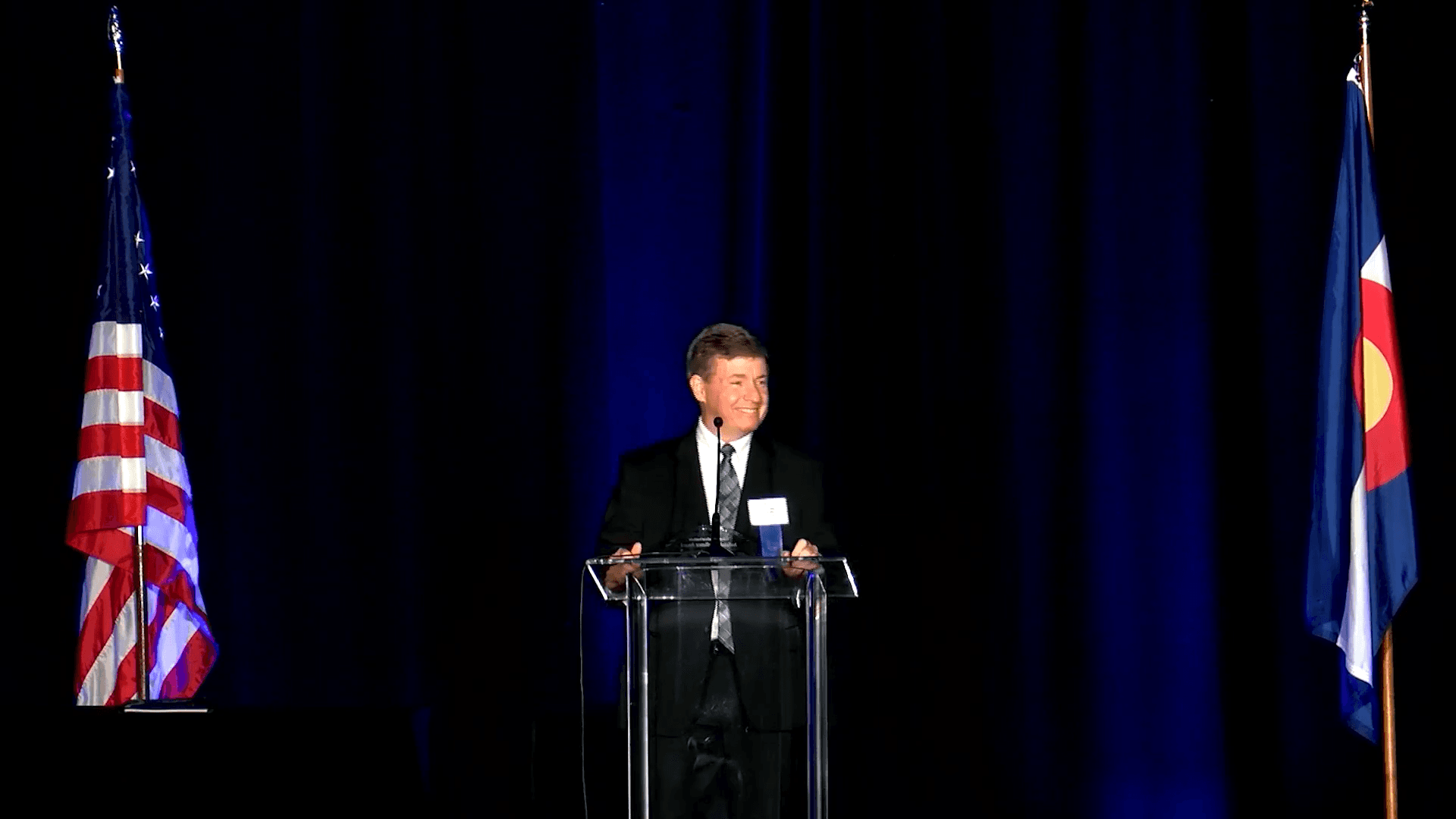
Colorado Courts Overcame COVID-19 to Sustain their Tradition of Excellence
Colorado courts went into overdrive in 2021 to successfully retain their traditions of excellence and fairness in the face of the COVID-19 Pandemic. More than 270 supporters gathered at the Hyatt Regency in Denver to celebrate their success as the Colorado Judicial Institute honored three outstanding jurists at CJI’s 19th annual Judicial Excellence Awards.
Established in 1979, the Colorado Judicial Institute (CJI) is a private, nonpartisan citizen organization dedicated to preserving fair and impartial courts in Colorado while fostering excellence in the state's judiciary and furthering public understanding of the legal system.
This year, CJI honored:
- Magistrate Sarah Zane of the 16th Judicial District covering Otero, Bent, and Crowley counties;
- Judge Mark Randall from Jefferson County;
- Judge Paul Dunkelman of the Fifth Judicial District, which spans Lake, Eagle, and Clear Creek Counties.
Magistrate Zane was the first female judicial officer in her southeast Colorado district. She helped bring the district's first child and family investigators as well as parenting classes. She also helped employers hire offenders who pay their arrears and child support.
"I want to help families reach their full potential. Families enter the courtroom with little hope as they are experiencing one of the worst moments of their lives. They need resources, our time, and mindset shifts that can help them heal and propel themselves forward. It is incumbent on us as judicial officers not to just check a box and call our next case – but instead to actually show each and every family compassion; offer them a real, acceptable solution to the problems facing their family and always leave them with some grace," Magistrate Zane said.
Fellow Jefferson County Judge Corinne Magid hailed Judge Randall for "rising to super-hero status" during the pandemic as he ought to keep the courts open and available to the people.
"We were checking if he was sleeping at all," Judge Magid said. "We were getting messages at two in the morning, then again at six in the morning.
Judge Randall told the CJI audience, "We have to keep the building open for people who don't have the technology, the smartphones and computers for virtual hearings. County Court is the people's court and people have a right to have their cases heard."
Randall was also honored for working with the Donor Alliance to develop a protocol that allows organ donations in criminal cases where they were once barred – a program that has made hundreds of organs available. He also works with an animal rescue group that has saved 1,003 cats and dogs since the pandemic began.
Judge Dunkelman's nomination hailed his tireless record in the Fifth Judicial District and his strong record of community involvement, including the Domestic Relations Institute and volunteering as a Mock Trial Judge for the Mock Trial Western Slope Regional Tournament.
"I want to thank CJI for what they do and what they stand for," he said. "Your mission has never been more important than it is right now. The judicial system faces challenges and pressures like never before. There is more attention on the legal system, less confidence in the legal system in some ways. That's not necessarily a negative – it's a challenge. With challenges come opportunities. It means judges need to do our jobs the right way, we need to do our job tomorrow better than we do it today and the next day to do it even better. It's on us to assure the public has confidence in the judicial system, not the other way around."
CJI also honored three of its outstanding leaders who passed away in the last year: Judge Bob Fullerton, attorney Pete Willis, and Dr. Ellie Miller Greenberg.
Colorado Supreme Court Justice Richard Gabriel, whose band "Judicial Notice" provided entertainment at the event, said Fullerton's 40-year run on the bench exemplified "wisdom, sound judgment, and deep-seated kindness."
Justice Gabriel noted that Willis, like Fullerton, had been an Eagle Scout and displayed "innate humility, sound judgment, and incredible kindness. Everyone that Pete met was the most important person in the world – because that was how he made you feel."
Justice Gabriel hailed Greenberg as a woman who was "light years ahead of her time as a champion of women's rights, civil rights, diversity, equity, and inclusion, a lifelong educator, prolific author, and proud member of the Colorado women's hall of fame."
She was also a co-founder of the award-winning Our Courts program that CJI co-sponsors with the Colorado Bar Association. Our Courts is a nonpartisan informational program to further public education and understanding of state and federal courts in Colorado. The program offers ten programs, four of them in Spanish. 20,000 people have attended more than 600 Our Courts presentations.
Besides honoring judicial excellence, CJI's annual awards ceremony helps promote that excellence by raising money for CJI's efforts on behalf of education and training for Colorado judges and court personnel. CJI also uses those funds to support the merit system of judicial selection that Colorado voters established in a 1966 constitutional amendment.
In many states, judicial elections are hotly partisan and heavily financed by the very lawyers and litigants that later appear in those same courts. In contrast, when a vacancy on the bench occurs in Colorado, nonpartisan review commissions review potential replacements and nominate two or three candidates to the governor. Once appointed, a judge serves at least two years before facing voters in a retention election. If voters decide not to give the judge a full term, the merit process starts over again. If retained, the judge serves a term of ten years on the Supreme Court, eight years on the Court of Appeals, six years for the District Court, and four years for county courts. At the end of the term, the judge can stand for retention to another term, but may not serve in office past his or her 72nd birthday.
The merit selection system is backed by high standards for judicial conduct and performance. An independent commission on judicial discipline reviews complaints against judges and may institute disciplinary or removal proceedings for violating the Code of Judicial Conduct. This commission also may retire a judge for disability of a permanent character interfering with the performance of duties.
Bob Ewegen, who retired from The Denver Post in 2008 after more than 36 years at the newspaper, is CJI Journalist in Residence and an emeritus member of the CJI board.

